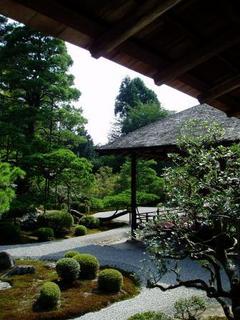 I went to Kyoto with my friends last week. There are so many sights to see, but I wanted to watch most the temple of Manshu-in(曼殊院), located in the north east part of Kyoto. Its name comes from a Bodhisattva in Sanskrit, but it is not a Buddhistic temple in nature mainly because in the Edo Era many of the imperial Princes were required to live there as Buddhistic priests lest they should participate in the politics.
I went to Kyoto with my friends last week. There are so many sights to see, but I wanted to watch most the temple of Manshu-in(曼殊院), located in the north east part of Kyoto. Its name comes from a Bodhisattva in Sanskrit, but it is not a Buddhistic temple in nature mainly because in the Edo Era many of the imperial Princes were required to live there as Buddhistic priests lest they should participate in the politics.The prince who built this was Ryo-sho-Ho Sin-no (良尚法親王: 1622-1693), whose father, Tomohito Sin-no, was frequently invited to tea ceremonies hosted by Toyotomi Hideyoshi, the person in power during the second half of the Aduchi Momoyama Era, who tried to be a court noble to keep his dynasty secure. They came to have a close relation. Probably, that's why Tokugawa Ieyasu, the person in power during the Edo Era following Aduchi-Momoyama Era, should have disliked and tried to exclude the court nobles.
I got interested in Manshu-in because I saw some of the beautiful pictures of Manshu-in in some books, websites, and magazines. Then I read some of the articles about Manshu-in written by my favorite author, Siva Ryotaro, who stopped by Manshu-in to see the garden every time he visited Kyoto, and I was itching to see the garden of Mansu-in. Here are some features of the garden below, he mentioned.
- Traditionally, a garden can be looked upon as a picture or drawing in Japan. You can say the garden is the center of the temple. I mean they designed houses for the places to enjoy watching the gardens. In most cases, they describe seceneries seen in forests deep in mountains because they need them to see their survival game in the present world in perspective. As I should add, rich persons in Japan are expected to have such gardens with houses. The same is true of Manshu-in. There, the Imperial princes lived. They tried to enjoy that.
- Can you see the white sand in the picture on the left? It is the river running. This kind of drawing is called "Kare-San-sui." Can you see the corridor with handrails, running along the sand river? You're required to think the passage be part of a roofed pleasure boat with a tatami floor and shoji, on which Japanese enjoy watching good sights sometimes drinking. You have to walk the corridor, but in your imagination you are in the boat floating on the river to a place deep in the mountains, and you may find yourself in the Pure Land, if you immerse yourself in the drawing.
